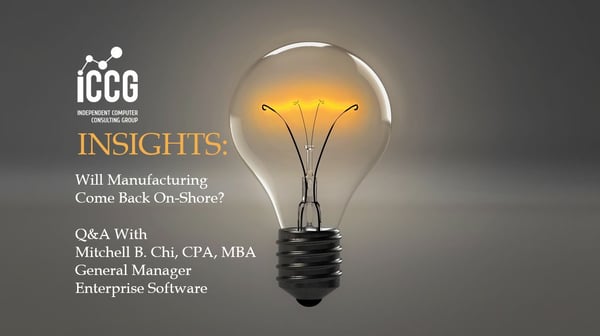Since 1983, Mitchell B. Chi, CPA, MBA, and General Manager - Enterprise Software, has worked with many Fortune 500 companies and hundreds of fast growth start-ups in designing low-cost agile business systems to stay ahead of the competition. He has authored numerous white papers, been a keynote speaker at national conferences, and continues to advise companies in building a “strategic vision with tactical results”.
Mitchell held executive positions with PriceWaterhouse, Goldman Sachs, Oracle, Infor, and 11 successful start-ups. A technology company he founded, MicroSage, won Small Business of the Year from the Small Business Administration. The next year MicroSage was awarded Minority Sub-contractor of the Year from the Department of Energy.
Mitchell is a dynamic and passionate speaker on many topics, especially how to stay relevant in today’s economy by empowering technology.
Q. The United States has depended on overseas manufacturing for many of our products which, in times like the current pandemic, has created a supply chain breakdown leading to stock out situations. In response to that do you think companies will focus on bringing more manufacturing back on shore to address this problem?
A. In the 1990’s, America sacrificed quality, availability, and brand loyalty for shareholder value, top line revenues, and acquisitions. The consumer was complicit in this, as they also sacrificed quality for price.
Fast forward to our current global quarantine and staying alive times. I believe the manufacturing reboot will be organic and with a huge “Buy America” movement, A.C. (After Corona). The US has a significant inventory of idle factories, the highest unemployment in history, and many families continue to be worried about basic commodities. Consider this: If there was a 10% increase due to “Buy America” that’s $2.15T of the US GDP of $21.47T. The trickle down could be as high as 5x or $10.75.2T from real estate (commercial and residential) renovations and durable goods to services and even, entertainment.
Supply chains are the most fragile in the “first leg”, raw materials to finished product inventory. Currently, with supply chains stressed, US based, leading companies are developing plans to fortify as much of the “First Leg” back to America. The answer is not hard assets and labor alone. Flexible and agile technology is core to any tactical execution.

Q. Having the right product at the right time, at the right place is easier said than done. This needs to be evaluated closely, as to the complete product lifecycle, from ideation to production needs to be monitored and quickly adjusted. What’s your POV?
A.C. (After Corona), companies must focus on “speed to market” or they will quickly disappear or worse, become irrelevant. B.C. (Before Corona) strong revenues and continual cost optimization, gave companies a “safety net” to experiment and test innovation. The Toyota Production System (TPS) converged assembly line manufacturing (all models are assembled on a single line. A dashboard for a van, will be installed right behind a sport car, because the assembly steps are the same), was the most significant, manufacturing process change with the Ford Model T. TPS reduced design to showroom to weeks vs. months, and in some cases years. Consumer trends were in the showroom, months ahead of competitors.
I am a big proponent of data driven decisions. React too quickly without accurate data will result in missed strategic goals, critical revenue and GP targets and in the worst case, losing market share. As we are experiencing with COVID-19, data is key to understanding and reacting to complex challenges. The foundation of TPS is data to immediately adjust parts delivery to the assembly point of installation, frictionless labor and assemble line speed/robotics.
A.C. there will be a massive jump in consumer and industrial spending. Competition will be fierce. Miss a deadline, design irrelevant products, and you will be gone.
Q. What can distributors do to encourage online sales to directly connect with their consumers?With the Teutonic shift in brick and mortar product showrooms for durable goods, increased access to product reviews, and analysis and increased production, distributors are entering a phase on Omni-channel commerce. A wholesale distributor must sell and deliver directly to their end customer. The first step is fortifying in-house logistics to support a 30-40% shift and growth adding a Direct to Customer (DTC+) sales channel. An eCommerce platform should be the last process deployed and tested. As we all know, taking an order is the easy part, delivering the products as promised is key to “customers for life”. This is not only for consumer products, but any industrial products.
Click Here to share your questions for our consultants.

